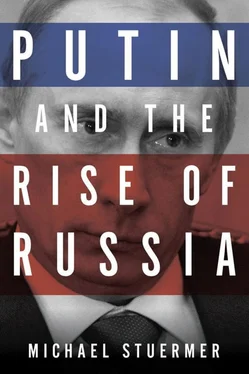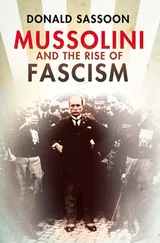And, most important of all, there is Europe and, beyond Europe, the United States of America, the latter so vast and so powerful that for Russia the Far West and the Far East almost coincide. For Russia and the Russians, the sun rises over America and the sun sets over America. This is not just symbolism. Cold War or no, Russia compares itself not with China or India, nor with Europe, but exclusively with the United States.
While this approach, by implication, affords Russia the status of superpower, especially in the UN dimension and in strategic arms control, other dimensions are patently absent from the equation. America’s military has what Russians do not have, the capacity to project power worldwide. The US rules the waves, Russia, from the battle of Tsushima lost against the Japanese to the explosion of the Kursk , has always failed in the maritime power game and is not likely to catch up soon. Iraq, the Russians console themselves, is slowly and inexorably becoming America’s Afghanistan – but not quite. There may well be an Iraq legacy, much as Vietnam left deep scars on America’s body and soul, but it will not be the beginning of the end of US superpower – as Afghanistan, twenty years ago, was for Russia. Today Russia can just about compete in the nuclear dimension, but not in terms of conventional power, cyberspace or maritime presence across the Seven Seas.
In today’s world, however, other elements of US expertise count for even more. While America’s ‘soft power’ [12] Josef Nye
reaches far beyond America’s hard power, winning the proverbial ‘hearts and minds’, Russia after the Soviet Union has little to offer in terms of soft power. America’s industrial capacity, research and development are the envy of many Russians, the standard by which to measure their own progress and the target of unrelenting industrial espionage. The US currency is still the benchmark of value, but Russians are beginning to have second thoughts, reading into the decline of the US currency a message of secular decline. Empowered by oil and gas, they consider extricating themselves from the sinking USS Greenback , putting their faith into the freely convertible rouble and keeping major savings in euros – though certainly not in Chinese renmimbi.
‘Does America need a foreign policy?’ Henry Kissinger famously asked. It was no surprise that the Doctor came out with a book prescribing medication based on balance of power, cooperation and compensation, alliances and containment of major adversaries. Russia, too, needs a foreign policy, but does Russia have one? Russians do not mind very much that Russia is, by and large, a country without friends as long as Russia wields a veto over great matters of global concern or lesser matters within its sphere of interest, territorial or political. In today’s world, one could imagine Kremlin leaders secretly citing to themselves Lord Palmerston’s words 150 years ago in the House of Commons: ‘We have no eternal allies and we have no perpetual enemies. Our interests are eternal and perpetual, and those interests it is our duty to follow.’
New chessboard, old rules
Russia’s policy-makers today claim an almost boundless measure of freedom of manoeuvre and sovereignty. This has vast practical implications, worlds apart from the Soviet orthodoxy which combined unlimited geopolitical ambition with the idea of a Marxist-Leninist ‘Third Rome’. It is much closer to tsarist aspirations for a place at the head table, control of warm seaports and strategic sea lanes like the Dardanelles or the Baltic approaches; most of Germany in the nineteenth century lived sous l’oeil des Russes , and so did the Balkans and much of Scandinavia. Russians also tend to remember fondly the informal veto in world affairs that they wielded before and after the Vienna Congress of 1814-15, not unlike today’s veto power in the UN.
Today, there is not much of an overriding doctrine beyond the pragmatism of oil and gas and the wish to translate eight years of windfall profits into a dominant position in the globalizing world of industry and finance, national self-respect and an acceptable idea of history past, present and future. There is a love-hate relationship with the US, a kind of cold marriage, forever strained but unlikely to end in divorce. The idea in Berlin and elsewhere that the quarrelling couple needs counselling, and that the Germans are called upon to provide friendly advice and mediation, is not of the real world. Russians and Americans know each other’s telephone numbers well enough, be it in the situation centres in Moscow and Washington, in anti-terror departments at the CIA and the FSB, or in those exclusive clubs concerned with non-proliferation.
Both sides still have important principles in common, and they share large parts of their risk assessment. They want to defend the present structure of the UN Security Council, regardless of other nations’ desire to take a seat at the High Table; they do not wish to admit new members to the nuclear club; they have an ambitious understanding of their own sphere of influence; and they fear the weapons and warriors of asymmetric warfare at home and abroad – while both sides tend to trespass, from time to time, into territory designated by the other side off limits. The Russians do resent interference by the West in the CIS and what they term the ‘near abroad’, and they are not impressed by the argument that any such interference is sanctified by democracy and liberal economics.
Too close for comfort is not only a rule to be observed in everyday life but also an important, though unspecified, part of the code of conduct between today’s great powers. This is a matter of territorial disputes, when US ships come close to Russia’s coastal waters and the twelve-mile zone, or Russian ‘Bear’ bombers on patrol cross, unannounced, into British airspace. All of this happened in the course of 2007. But coming too close is also a question of meddling in each other’s domestic affairs. US preaching about human rights and democratic values is suspected, by the Russians, as being subversive and part of a major attempt to undermine the present regime through all kinds of NGOs, foundations, publications and, ultimately, colour revolutions, from Ukraine in the west to Georgia in the south.
On the American side there is no real equivalent; the Russians are mostly not taken seriously as a powerful adversary, either in the Balkans, the Caucasus – especially Georgia – or throughout Central Asia. This is not only irritating for the Russians, it is also positively dangerous as it can lead to strategic misunderstanding concerning the value each side ascribes to its assets or what it sees as a vital interest.
The accession of Poland and the three Baltic states to NATO after 1994 is a case in point, and it has never been forgiven in Moscow. After the implosion of the Soviet empire and the inclusion of Germany’s eastern provinces in NATO, military and diplomatic experts in the West had suggested that ‘Partnership for Peace’ (PfP) might be a wise answer to a pressing problem, allowing the Russians to save face while giving enough warmth to the countries coming in from the cold. But Bill Clinton wanted reelection in 1994, and in crucial states of the American Midwest the Polish vote could mean victory or defeat. US domestic pressure at election time put the issue of Polish accession to NATO high on the US agenda. This was followed, inevitably, by more enlargement until the three Baltic states had been incorporated. NATO experts, in a display of black humour, called the exercise ‘a bad idea whose time has come’. The Russians still feel that, after the ‘Two plus Four’ agreement in 1990 had suggested that the Oder river would be the future eastern border of the Western alliance, the West has cheated.
Читать дальше











